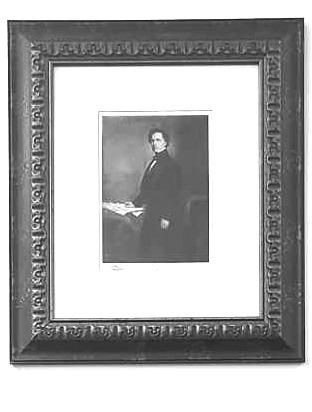A few facts to know about Franklin Pierce on President’s Day
President Franklin Pierce is honored every day locally in the county that bears his name.
Although President's Day honors the birthdays of two of the greatest American Presidents, George Washington and Abraham Lincoln, Pierce County is named for the 14th president of the United States, Franklin Pierce, a New Hampshire Democrat who served from 1853-1857. Pierce County was created by the Georgia Legislature in 1857 a few months after President Pierce left office.
Pierce’s portrait hangs in our courthouse and his name is everywhere and on everything locally as the county was named in his honor.
He was thought well-enough locally, that a newly created county in Southeast Georgia was named for him.
History has not been kind to him, however. Pierce, though a northerner from New Hampshire, was a strong supporter of state's rights and by association he is largely blamed with poor decisions and sectional strife that eventually led to the nation’s bloody Civil War.

Sara Dobrowolski, Manager of the Franklin Pierce Homestead of the Bureau of Historic Sites with the New Hampshire Department of Natural & Cultural Resources, says she is unaware if President Pierce knew about his namesake county in South Georgia, but she thinks someone may have told him during his lifetime. All local county records that may have a direct link to President Pierce have been lost or were destroyed in a fire in the courthouse in the early 1900s.
Dobrowolski shared her vast knowledge of President Pierce with The Times. She says President Pierce’s life and legacy is complex — as it is with most presidents.
“It’s only in modern times that he’s being referred to as (a poor president). Politics had become very polarized, as they are now,” Dobrowolski points out.
A review of information from the New Hampshire Historical Society reveals much about our 14th chief executive.
Pierce was an accomplished politician from a patriotic family.
The son of a Revolutionary War veteran and New Hampshire Governor, Pierce was elected to the New Hampshire State Legislature, the United States House of Representatives and the United States Senate. Pierce was the youngest speaker to ever serve in that office in the New Hampshire Legislature and served as a Brigadier General in the Mexican War.
When the Democrats’ met for their convention in 1852, there was no clear front-runner for the presidential nomination and Pierce was a long-shot candidate. Finally nominated as a dark horse candidate on the convention’s 49th ballot, the Democrats campaigned on Pierce’s charm and personal history, as narrated in a campaign biography by his old college friend, Nathaniel Hawthorne, famed author of The Scarlet Letter.
Pierce defeated his Whig Party opponent and his former Mexican War commander, Winfield Scott, with just 51 percent of the vote, though he won by a landslide 254-42 in the Electoral college.
The crowning achievement of his political career, his presidency began with personal tragedy.
President Pierce and his wife, Jane, had three sons. All three of the Pierce sons died as children. The last surviving son, Bennie, died in a train accident witnessed by his parents a month before President Pierce took office. The President and Mrs. Pierce never fully recovered from the tragedy.
Pierce did have some achievements during his term in the White House.
While President, he reduced the national debt by 60% from $75 million to $35 million, established the office of the United States Attorney General, modernized the Army and Navy, improved relations with Canada, established trade with Japan and expanded our national borders, including lands that are present day Arizona and New Mexico. He kept the nation from war and was probably the most honest and ethical president up to that time.
Ultimately, however, sectional tensions over slavery and the pending Civil War proved to be Pierce’s undoing.
Pierce believed that the U.S. Constitution gave states the legal right to allow slavery, if they chose to do so. He feared that agitation over slavery would lead to the breakup of the Union and possible civil war. He, like the other presidents who were in office during this era, looked for compromises that would alleviate the polarization between northern and southern states. None of those compromises were successful.
Pierce himself abhorred slavery and never owned slaves.
Pierce was set aside by Democrats in 1856, and became the only sitting president who was not nominated by his party for re-election, when he announced he was running for a second term. He was succeeded by James Buchanan, who typically outranks Pierce as the nation’s worst president.
Pierce was not enthusiastic about serving a second term, due to Mrs. Pierce’s poor health. He did, however, achieve something of a comeback when there was a movement to re-nominate him in 1860. He refused the offer.
President Pierce lived a dozen years after leaving the White House. He tried to influence public opinion after his White House years, but his views were often contrary to the administration of Abraham Lincoln. He lived through the Civil War and its aftermath.
Personal tragedy and depression took its toll on him and he died in 1869 at the age of 64.
Franklin Pierce Homestead of the Bureau of Historic Sites, New Hampshire Department of Natural & Cultural Resources and The New Hampshire Historical Society, Sara Galligan, director, contributed to this story.









